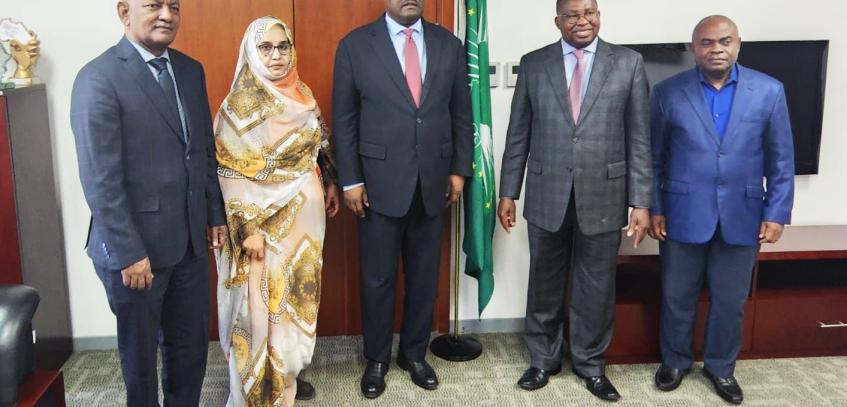Present at the African Union (AU) Headquarters in Addis Ababa in preparation for the 42nd Ordinary Session of the Executive Council and the 36th Ordinary Session of the Assembly of the AU, the Bureau of the Pan-African Parliament (PAP) met with H.E. Albert M. Muchanga, AU Commissioner for Trade and Industry.
The working meeting explored synergies to promote the AU theme of the year 2023. In fact, the 36th AU Summit is expected to officially declare “Acceleration of AfCFTA Implementation” as the Union's focus for this year.
The Department of Trade and Industry’s core mandate is to support the AU in boosting intra-African trade, fast track establishment of the African Continental Free Trade Area ( AfCFTA) and ensure Africa’s competitiveness in the global economy. It supports Africa’s transformation by promoting diversification and the modernisation of production structures.
The PAP delegation led by H.E Hon. Chief Fortune Charumbira briefed the Commissioner on the different activities lined up by the Continental Parliament to contribute to the AU’s efforts to accelerate the implementation of the AfCFTA. African Parliamentarians are expected to play a decisive role in the sensitisation of the African citizenry and monitoring of the progress with regard to this highly important agreement. One of the key functions of the PAP is to facilitate and oversee the implementation of AU policies, objectives and programmes.
The AfCFTA Agreement entered into force on 30 May 2019 for the 24 countries that had deposited their instruments of ratification with the African Union Commission (AUC). This date marked 30 days after the 22nd instrument of ratification was deposited, as stipulated in Article 23 of the AfCFTA Agreement. The operational phase of the AfCFTA Agreement was officially launched on 7 July 2019. In line with a Decision and Declaration adopted during the 13th Extraordinary Summit of the Assembly of the Union on 5 December 2020, the start of trading under the AfCFTA regime began on 1 January 2021 under an ‘interim arrangement’.
During a debate on the Report of the AfCFTA Agreement held by the PAP at its first Ordinary Session of the 6th Parliament in November 2022, members of Parliament expressed overwhelming support for the Agreement despite constraints that have arisen in the implementation stage.
A lack of sufficient infrastructure, sluggish democratic change, corruption, and a dearth of funding, amongst others, were some challenges raised by several members of the Chamber during the debate session.
44 of the 54 signatories (81.5%) have deposited their instruments of AfCFTA ratification. The fact that there are countries that still have to take measures to ratify the Agreement was described as a concern by Members of the PAP.
“We need to determine why some countries are keen to trade but they do not want to ratify the Agreement,” said H.E. Hon. Chief Fortune Charumbira, President of the PAP.
“The AfCFTA is essential for the development of Africa, and we need to follow its progress and communicate the outcomes clearly,” H.E. Hon. Charumbira added.
The AfCFTA is a high-ambition trade agreement, with a comprehensive scope that includes critical areas of Africa’s economy, such as digital trade and investment protection, amongst other areas. By eliminating barriers to trade in Africa, the objective of the AfCFTA is to significantly boost intra-Africa trade, particularly trade in value-added production and trade across all sectors of Africa’s economy.
The AfCFTA is the world’s largest free trade area bringing together the 55 countries of the African Union (AU) and eight (8) Regional Economic Communities (RECs). The overall mandate of the AfCFTA is to create a single continental market with a population of about 1.3 billion people and a combined GDP of approximately US$ 3.4 trillion.
-Ends-








